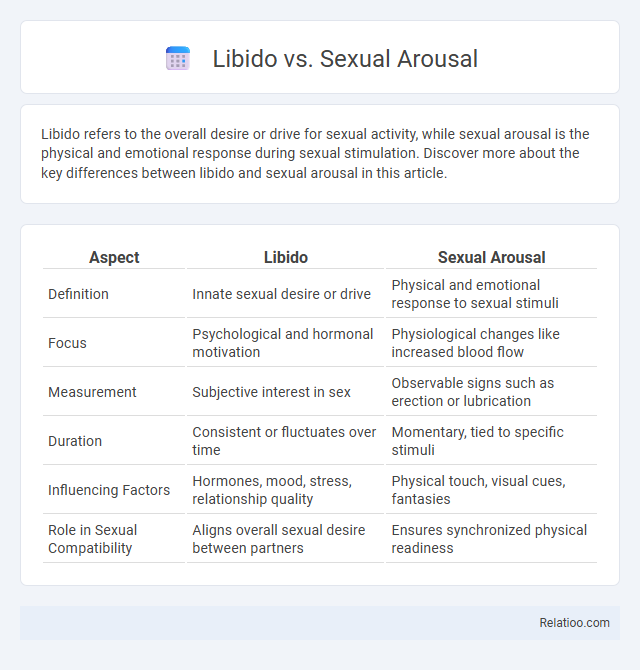Libido refers to the overall desire or drive for sexual activity, while sexual arousal is the physical and emotional response during sexual stimulation. Discover more about the key differences between libido and sexual arousal in this article.
Table of Comparison
| Aspect | Libido | Sexual Arousal |
|---|---|---|
| Definition | Innate sexual desire or drive | Physical and emotional response to sexual stimuli |
| Focus | Psychological and hormonal motivation | Physiological changes like increased blood flow |
| Measurement | Subjective interest in sex | Observable signs such as erection or lubrication |
| Duration | Consistent or fluctuates over time | Momentary, tied to specific stimuli |
| Influencing Factors | Hormones, mood, stress, relationship quality | Physical touch, visual cues, fantasies |
| Role in Sexual Compatibility | Aligns overall sexual desire between partners | Ensures synchronized physical readiness |
Understanding Libido: Definition and Key Factors
Libido refers to your overall desire or drive for sexual activity, influenced by biological, psychological, and social factors such as hormone levels, stress, and relationship quality. Sexual arousal is the physiological and emotional response to stimuli, marked by changes like increased blood flow and lubrication, which may occur independently of libido. Understanding the key factors affecting libido helps in distinguishing it from sexual arousal and desire, facilitating better management of sexual health and well-being.
What is Sexual Arousal? Core Concepts Explained
Sexual arousal is a physiological and psychological response characterized by increased blood flow to genital areas, heightened heart rate, and sensory sensitivity, preparing the body for sexual activity. Unlike libido, which refers to the desire or drive for sexual activity, sexual arousal involves the body's immediate physical reactions triggered by stimuli. Understanding sexual arousal is crucial for differentiating between the emotional motivation to engage in sex (libido) and the actual bodily readiness for sexual experience.
Libido vs Sexual Arousal: Main Differences
Libido refers to Your overall desire for sexual activity, driven by psychological, hormonal, and emotional factors, while sexual arousal is the immediate physiological response to sexual stimuli, including increased heart rate, blood flow, and lubrication. Libido reflects a more persistent, overarching sexual drive, whereas sexual arousal fluctuates in response to specific situations or sensory input. Understanding the distinction helps in addressing sexual health issues, as low libido may require different treatment than problems with sexual arousal.
Biological Influences on Libido and Arousal
Biological influences on libido and sexual arousal primarily involve hormonal regulation, with testosterone playing a crucial role in driving sexual desire in both men and women. Neurotransmitters such as dopamine and serotonin also impact the intensity and frequency of sexual arousal by modulating brain reward pathways. Understanding how your endocrine system affects libido and arousal can help identify underlying causes of sexual dysfunction and improve overall sexual health.
Psychological Factors Affecting Libido and Sexual Arousal
Psychological factors such as stress, anxiety, and depression significantly impact libido and sexual arousal by altering hormone levels and neural pathways associated with desire. Emotional intimacy, self-esteem, and past trauma also play critical roles in modulating sexual motivation and physiological response. Addressing mental health through therapy and stress management can effectively improve both libido and sexual arousal by restoring psychological balance.
The Role of Hormones in Desire and Arousal
Hormones such as testosterone, estrogen, and oxytocin play a crucial role in regulating libido, sexual arousal, and overall sexual desire by influencing brain regions involved in motivation and pleasure. Your hormonal balance directly impacts the intensity and frequency of sexual desire and arousal responses, with fluctuations often leading to changes in libido or the physical readiness for sexual activity. Understanding the distinct effects of these hormones helps clarify the difference between libido (psychological desire) and sexual arousal (physiological response) in your sexual health.
Common Myths About Libido and Sexual Arousal
Libido and sexual arousal are often confused but represent different aspects of human sexuality, with libido referring to your overall desire for sexual activity and arousal relating to the physical and emotional response during sexual stimulation. Common myths suggest that a high libido always equals frequent sexual arousal or performance, but in reality, your sexual desire, hormonal levels, and psychological state can variably influence these elements. Understanding the distinction helps debunk misconceptions about sexual health and promotes a more accurate view of your body's responses and needs.
Relationship Dynamics: Impact on Libido and Arousal
Relationship dynamics significantly influence both libido and sexual arousal, as emotional connection, communication, and trust deeply affect your desire and physical response. Stress, unresolved conflicts, and lack of intimacy can lower libido and hinder arousal, disrupting the natural interplay between mental and physical sexual stimuli. Understanding how relationship factors modulate these aspects helps in fostering a healthier sexual connection.
When Libido or Arousal Is Low: Causes and Solutions
Low libido and sexual arousal can stem from hormonal imbalances, stress, medication side effects, or underlying health conditions such as diabetes or depression. Addressing these causes often involves lifestyle changes, hormone therapy, counseling, or medical intervention tailored to your specific needs. Understanding the distinction between libido (desire) and arousal (physical response) helps in selecting the most effective solutions to enhance your sexual health.
Enhancing Sexual Well-Being: Tips for Balancing Libido and Arousal
Balancing libido and sexual arousal plays a crucial role in enhancing sexual well-being by aligning desire with physical responsiveness. Your body's hormonal levels, stress management, and emotional connection significantly impact libido and arousal, making it essential to maintain overall health and open communication with your partner. Incorporating regular exercise, mindful relaxation techniques, and a nutrient-rich diet can effectively support sexual function and satisfaction.

Infographic: Libido vs Sexual Arousal
 relatioo.com
relatioo.com